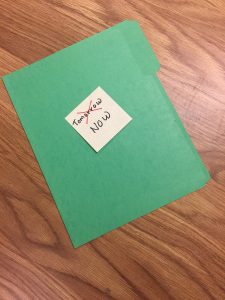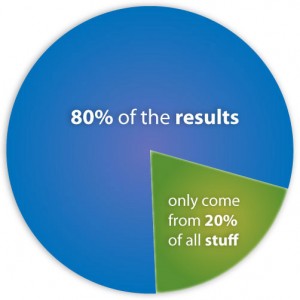 Here are some strategies that can help. The example we’ll use applies them to paper clutter, but they can help you get moving on any clutter-busting project.
Here are some strategies that can help. The example we’ll use applies them to paper clutter, but they can help you get moving on any clutter-busting project.
Often, seeing something concrete will get you moving, especially if you’re a visual person.
 Ever heard of the 80/20 rule? An Italian economist, Vilfredo Pareto, first talked about it roughly 100 years ago, when he observed that 80% of Italy’s wealth was in the hands of 20% of the population. Since then, the “Pareto Principle” has been found to have widespread applicability: in most situations, 80% of the benefits come from 20% of the causes.
Ever heard of the 80/20 rule? An Italian economist, Vilfredo Pareto, first talked about it roughly 100 years ago, when he observed that 80% of Italy’s wealth was in the hands of 20% of the population. Since then, the “Pareto Principle” has been found to have widespread applicability: in most situations, 80% of the benefits come from 20% of the causes.
There are many everyday examples of the 80/20 Rule.
The Pareto Principle is enlightening to me when I apply it to my clients’ complicated relationship with paper.
I think Pareto was onto something here. Could it be that in any stack of ten papers, roughly two of them are truly valuable? Could we train ourselves to zero in on those vital two and let the other eight go without agony or regret? What do you think?
Still struggling? Professional organizers are compassionate helpers skilled at guiding their clients to zero in on that valuable 20% worth keeping, whether it’s paper, household clutter, or excessive time commitments. Use the Find An Organizer feature on this web site to locate an organizer near you.
Click on the title above to learn more about the featured author.
 If you are reading this, chances are that you will need an executor and/or will be an executor at some point in your life. An executor is the person named in a will to administrate the estate of the person who died leaving that will. The job of the executor is to make sure that the deceased person’s wishes, as described in the will, are carried out.
If you are reading this, chances are that you will need an executor and/or will be an executor at some point in your life. An executor is the person named in a will to administrate the estate of the person who died leaving that will. The job of the executor is to make sure that the deceased person’s wishes, as described in the will, are carried out.
Here are some of the tasks executors perform:
These tasks can be complex, full of “red tape” and frustrating, so it is important to choose the right person for the job.
A good executor is:
Too often, people making a will choose their executor based on family dynamics or out of a wish to bestow an ‘honor’ on a special person in their life. They give little consideration to the personal traits and skills needed by the executor, with disastrous results. As a professional organizer specializing in finances and paperwork, I have witnessed these horror stories when the wrong person was chosen for the job of executor:
The key take-away from this post is to choose your executor carefully, based on the skills needed to do the job. But perhaps, you have already chosen an executor who lacks some of these skills, and you don’t want to make waves by changing. Or maybe, you have been named as someone’s executor and feel unqualified for the job. In either case, don’t despair, because help is available. Professional organizers can help inventory the deceased person’s possessions, and can help sell and/or donate possessions not inherited by a specific individual. Some organizers specialize in the organizing of finances, paperwork and information, and can help with these aspects of the executor’s job. A good place to find an organizer to help with the administration of an estate is the ‘Find an Organizer’ link at www.napo-gpc.org.
What reaction comes up in you when you hear that phrase? “I’ll think about that someday–in the distant future.” “I’m too young to bother with that stuff.” “That’s for people with problems I don’t have yet—thank God.” “I wouldn’t know where to begin.” “I don’t have any affairs to get in order!”
Do you have children under your care? Are you responsible for an aging relative, in whole or in part? Is there someone with disabilities in your life? Do you feel uneasy when you hear of a catastrophic event happening to someone younger than you? Do you treasure your independence? Do you own a home and/or things that are special to you? Do you do everything legally within your power to minimize your annual income taxes?
If you answered “yes” to even one of these questions, then starting now to get your affairs in order might make sense for you.
We usually associate getting our affairs in order with legal documents and professional experts such as wills, powers of attorney and advance directives, lawyers, accountants and financial planners. While these documents and experts certainly play important roles in your well-ordered affairs, just making a few basic lists yourself can be a useful start:
Still feeling daunted? You might consider enlisting the help of a professional organizer to get your affairs in order. Professional organizers are experts at helping people sort through quantities of papers and objects, separate the important from the inessential, and arrange useful objects and information in systems that are easily accessed and used. Getting your affairs in order is just a process for capturing the essential information about you as a person and what you own, in a form that can be used readily by others if you become unable to communicate, along with legal documents that clearly express how you want yourself and your possessions to be handled. You can do this, and an organizer just might provide you the support you need to get started!
In my work organizing finances and paper for aging adults and people with chronic illnesses and disabilities, certain problems tend to recur. Among them are:
Here are five different web sites I have found useful in addressing these issues:
Better World Books (http://www.betterworldbooks.com/)
Several years ago, I helped close out an estate that included nearly one thousand books. They were heavily concentrated in engineering subjects, and varied in age from 15 to 100 years old. The owner was emphatic that they not simply be recycled or buried in a landfill, and that they should benefit people in need if at all possible. Better World Books provided the way to grant these wishes. This organization is a huge on-line used book store. They accept any size donations of books, and try first to sell them through the web site. Proceeds are used to fund literacy programs around the world, but, even more important to my client, books not sold through the web site are actually shipped to third-world countries that can use them. Only when these two alternatives are exhausted are the books recycled—and never sent to a landfill. Better World’s staff was extremely helpful, and taught me how to inventory and package the books. Better still, they sent a tractor trailer to the site to pick the books up and transport them to the Better World facility, all at no charge to my client or me.
Care Calendar (http://carecalendar.org/)
In the site owners’ own words, “Care Calendar is a web based system to organize meals and other help for families during a time of illness or life changing event, such as the birth of a baby or death of a family member. “ It allows a family, group of friends, or organization to coordinate care for an individual in need by posting and responding to assignments such as meals, visits, rides and errands. Currently, I am using Care Calendar to coordinate care for a frail elderly woman living in her working daughter’s home. I posted the mother’s needs on the web site, and friends and family members have responded to fill every assignment. Care Calendar greatly reduces the need for phone calls and follow-ups, as the site forwards me and the care recipient a list of upcoming assignments and volunteers on a daily basis. The service is offered free of charge, and donations are invited.
Get Human (http://gethuman.com/)
Did you know you can talk to a live human being at Amazon or Ebay? Get Human enabled me to do just that. The site provides free direct-dial contact numbers for over 8,000 businesses, along with other direct contact avenues such as call-backs, live chat and email.
It’s Deductible (http://turbotax.intuit.com/personal-taxes/itsdeductible/)
How do you know how much to deduct as a charitable contribution on your taxes when you give away a mountain of things? It’s Deductible, a free online service from the makers of TurboTax software, combs the internet for actual selling prices of commonly-sold items. The site allows the user to create lists of items donated, by charity, by date, and then provides the fair market value for the item. Where prices aren’t available, guidelines on establishing the FMV are provided. At tax time, the lists can be printed out or imported into TurboTax. I have been using this service for myself and for my clients for nearly ten years, and have yet to be challenged by the IRS.
Medicare’s Nursing Home Compare (http://www.medicare.gov/default.aspx, then select Resource Locator/Nursing Home Compare)
Three years ago, this free service quickly allowed me to find nearby nursing homes and compare them on a host of relevant features when my father suddenly became too ill for me to care for him in my home. I found a wealth of excellent advice that enabled me to make a rapid decision with confidence. A similar comparison feature is available for Home Health Care in the same Resource Locator menu.
Did I mention that all of the above sites do what they do for free? If you or someone you care for is facing worsening illness, down-sizing or simple frustration contacting businesses, give one of these sites a try. I’m confident they’ll help you as they’ve helped me and my clients.
As an organizer of medical and financial records for seniors and others affected by age, illness and disability, I get this question a lot. A person with multiple medical conditions can quickly acquire cartons of paperwork from Medicare, doctors’ offices, and health insurance companies.
It’s helpful to start with what medical EOBs prove:
So, medical EOBs can be useful for:
Obviously, keeping medical EOBs is worthwhile for some period of time. What to do with it all and how long to keep these records will vary with your personal situation. Here are two sets of guidelines for medical EOB retention periods and good practices – one for people in normal health and one for people with chronic, debilitating or terminal health conditions:
Normal Health
1. Keep medical EOBs in a file for one year. As the bills and EOBs for a medical service come in, match related items together, and address any discrepancies you detect. Examples might include double billing or your health insurance company overlooking the fact that you have met your deductible.
2. If, at the end of the year, you find you have paid enough in medical bills to qualify for the medical tax deduction, file the medical EOBs with your tax documentation, and keep for seven years.
3. If you do not qualify for the medical tax deduction, and the medical bills have been paid in full by you and all providers, and you are no longer doctoring for the condition, you can safely shred last year’s crop of medical EOBs while you’re wrapping up your taxes.
4. If some bills are still outstanding or the patient is still receiving treatment, keep the related EOBs for another year, and repeat the process.
Serious Health Condition
1. Keep a current file close at hand for this year’s medical EOBs. As the bills and EOBs for a medical service come in, match related items together, and address any discrepancies you detect.
2. At the end of the year, store all of these records in date order, keeping items you’ve matched up together, in a less prominent place. You could use a file cabinet in another room or a cardboard file box in a dry, mildew-free storage area. If you claimed the medical tax deduction, put a note in your tax records cross-referencing these health files.
3. Keep these medical records according to this timeline:
a. For five years after the serious health condition has cleared up.
b. For seven years if you’ve claimed the medical deduction.
c. Indefinitely, if the patient is chronically ill.
d. Until the executor informs you that the estate is completely wrapped up, if the patient has passed away.
In both of the above situations, you can keep the medical records on paper or scanned onto a computer based on your preference. If you keep paper files, keep them out of areas where they can get wet, e.g., a basement floor. If you go the electronic route, be sure to back up your data reliably.
One final note: Don’t panic if you need one or more medical EOBs or haven’t kept them according to the above guidelines. All health insurers, including Medicare, can replace an EOB, because they store them electronically.
Notifications